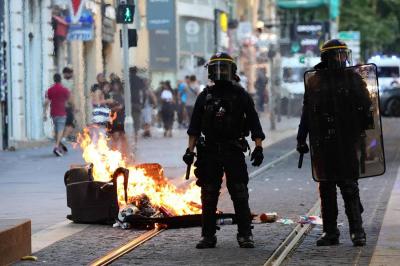The killing of the Algerian Nael Marzouki by a police officer has raised long-standing questions about the state of the French police and the failure of successive governments to reform this institution, which is closely tied to powerful police unions. In a country that suffers from regular waves of unrest, often leading to calls for the suppression of rioters, it may be difficult to criticize the police, which is under pressure and losing some of its members. However, experts say that authorities can no longer ignore accusations from human rights groups about the prevalence of racism within the police force, racial profiling, and issues related to recruitment, training, and police doctrine.
**A Volatile Mix**
Historian Cédric Mas wrote on Twitter, "The constant thing is the political powers' refusal to work on one factor of this volatile mix, which is the police." He continued, "Riots in the United States and the UK in the 1960s and 1980s led to deep reforms within police forces. In France? Nothing has happened over the last forty years." Several Western governments, such as the UK in 2011 and the United States with the Black Lives Matter movement in 2013, felt the need to address racial unrest against the police over the decades. However, France has long refused to acknowledge that racism plays a role in riots.
**Protests**
French government ministers who attempted to reform the police and grant more independence to the police oversight body (IGPN) did so at their own risk. In June 2020, former Interior Minister Christophe Castaner prepared plans to reform the police, which included banning the choking of individuals during arrests, reforming the police oversight body, and enforcing a zero-tolerance policy towards racism within the force. Following protests from police unions, a decision was made to appoint Gérald Darmanin instead of Castaner in a cabinet reshuffle a month later. Frank Louvrier, who served as a communications advisor to former President Nicolas Sarkozy while he was Minister of the Interior, stated, "You either support the police or you face problems." He added, "The Ministry of the Interior is based on the human factor and your feelings towards them, because police officers are attacked every day."
**Racism**
At the heart of the riots shaking the working-class suburbs of French cities, human rights groups have long directed accusations of systemic racism against the police. The United Nations Human Rights Office expressed concern about the situation in France and urged the government to address racial discrimination. Spokesperson Ravina Shamdasani stated, "This is an opportunity for the country to seriously address the deep issues of racism and racial discrimination in law enforcement." According to police unions and the Interior Minister, there are only occasional instances of racism. Anthony Kay from the CGT police union told Reuters, "Yes, there are racists, and no one denies that... but systematically, I don't know what that means."
Since France does not officially address skin color and limits the use of racial statistics, it is difficult to obtain data supporting the widespread grievances among racial minorities regarding police targeting and discrimination against them. However, the recurring evidence from reports is abundant. In an important ruling, the Paris Court of Appeals stated in 2021 that discrimination was behind police actions verifying the identity of three high school students, who were French citizens of Moroccan, Malian, and Comorian descent, while they were at a train station in Paris in 2017. The court decided at that time to grant each of them €1,500 in compensation, plus legal fees. However, such penalties are rare, and human rights groups say police officers often end up facing light penalties, fueling a sense of impunity.
**Police and Society**
Sociologist Sébastien Roche, editor-in-chief of the magazine "Policing & Society," stated, "What we see is that it is difficult for judges to issue prison sentences for police officers. This is not a situation unique to France, as there are also challenges in convicting and punishing police officers in the United States and Northern countries."
**Yellow Vests**
After the "Yellow Vests" crisis in 2018-2019, which saw violent protests and police crackdowns over several months, criticism of police doctrine and its plans was renewed. The rise in fatal police shootings in recent years has been linked to the 2017 law, which broadens the circumstances under which a police officer can use their firearm. The law came into force following an attack by Islamist militants in Nice in 2016. It allows police officers to open fire if they believe it is "likely" that the driver will endanger people. Critics say this provision is a gray area. Kyle from the left wing of the CGT police union stated, "It is not entirely clear and allows more freedom when firing." He added, "The 2017 law needs to be repealed."




